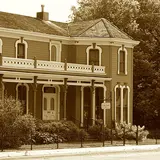
Beyond the Spotless Home: A Forgotten 19th-Century Critique of Domestic Perfection

Throughout American history, the role of the homemaker has been both celebrated and scrutinized. Until relatively recently, the domestic sphere has largely been considered a woman’s domain, defined by the societal expectations of cleanliness and moral upbringing. In the 19th century and beyond, enormous technological advancements have eased some household burdens, but cultural norms have still demanded that women maintain impeccable homes as a reflection of their virtue.
By the 20th century, the Cult of Domesticity had firmly established the ideal woman as both morally pure and—above all—devoted to her home. But some voices began to challenge the notion that a woman’s worth should be measured solely by her housekeeping. Among these was the 1889 guide, House and Home, which critiqued the extremes of domestic perfectionism.
The passage from House and Home reads:
No sensible person complains of a woman’s love for, and pride in her Home. Such love and pride ennobles her. It is when she binds thought, strength and sentiment down to slavish toil, over and beyond the obligation to keep her house clean, comfortable and tasteful, that she comes short of the queenly office of Home-Maker. For, be it distinctly comprehended, our “nasty-particular” house- wife does not slave herself and daughters to death for others’ good. Husband and children would live as happily, die as peacefully and go to heaven as surely if the picture-cords and hooks were left undusted for six weeks at a time. It is but decent and wholesome to wipe the dust from tables and chairs, but one’s spiritual status should not depend upon the daily use of the Four Utensils. An overlooked cobweb in the garret is a minor violation of the duty owed to God and man by comparison with rusted sympathies and Pharisaical condemnation of the publican woman who, standing afar off in the court littered with toys and books, her happy, boisterous children clinging to her skirts and climbing into her loving arms,—durst not lift up so much as her eyes toward the speckless abode ruled over by her sneering censor. Housekeepers may be hired. Home-Makers are won by no wages except love.
The Housekeeper says “My house,” pridefully, arrogantly”—sometimes, when her subjects are “difficult”—defiantly.
The Home-Maker talks with tender humility of “Our Home” —recognizing within the material structure, the building not made with hands, eternal in the hearts of those who have borne, each a share, in rearing and beautifying it.
The author, Marion Harland, distinguishes between a healthy pride in our home and the obsessive version of housekeeping that serves no real benefit to the family. A home should be a place of warmth and affection, not a spotless shrine. An immaculate house matters far less than the emotional well-being of its inhabitants. Harland condemns women who look down on others for having less tidy homes, contrasting the “speckless abode” of the judgmental housekeeper with the joyful chaos of a loving mother’s household. A “housekeeper,” she says, maintains physical order, often with a sense of defiance, while a “homemaker” creates a space for love, unity, and shared ownership of the home’s spirit.
Though written in 1889, this still feels strikingly relevant. We hear echoes of modern conversations about work-life balance and the pressure on women to “do it all.” Social media exacerbates these issues, because it tends to amplify unrealistic standards of domestic perfection. Many of us feel sadly inadequate if our homes aren’t Instagram-ready.
Harland crosses the barrier of time to remind us of the following: let us practice compassion for ourselves, and reject the messages of toxic productivity in which we seem to be drowning. The idea that a home’s true value lies in love, and not spotlessness, is a timeless reminder that relationships matter more than chores.
Marion Harland, by the way, was the (unisex-sounding) pen name of Mary Virginia Terhune, who was a groundbreaking American author and early advocate for women’s education. Over her six-decade career, she wrote more than 70 books, including novels, cookbooks, and, like the one here, homemaking manuals that blended practical household advice with thoughtful commentary on women’s roles. Born in Virginia to an educated family, she published her first bestselling novel, Alone (1854), at just 24, launching a prolific literary career. Writing under such a pseudonym allowed her to navigate both fiction and domestic advice without the constraints of 19th-century gender expectations.
Harland did become best known for her homemaking guides. Other titles include Common Sense in the Household (1871), and The Dinner Year-Book (1878). Throughout her works for women, she argued that women should not sacrifice their well-being for domestic perfection, a radical idea at the time. Beyond practical advice, she encouraged women’s intellectual growth and financial self-sufficiency, subtly challenging traditional gender norms.
Today, Harland’s insights still feel fresh, as many modern women grapple with an unrealistic mental load that spans domestic, professional, and intimate spheres. More than just a domestic authority, Marion Harland was a quiet reformer whose work continues to inspire those seeking harmony between household duties and personal fulfillment.
So, as Ms. Terhune affirms, a woman’s worth is not in her dusting, but in her ability to nurture a loving, welcoming space. Today, as society continues to redefine gender roles and domestic expectations, this message endures: people over perfection.